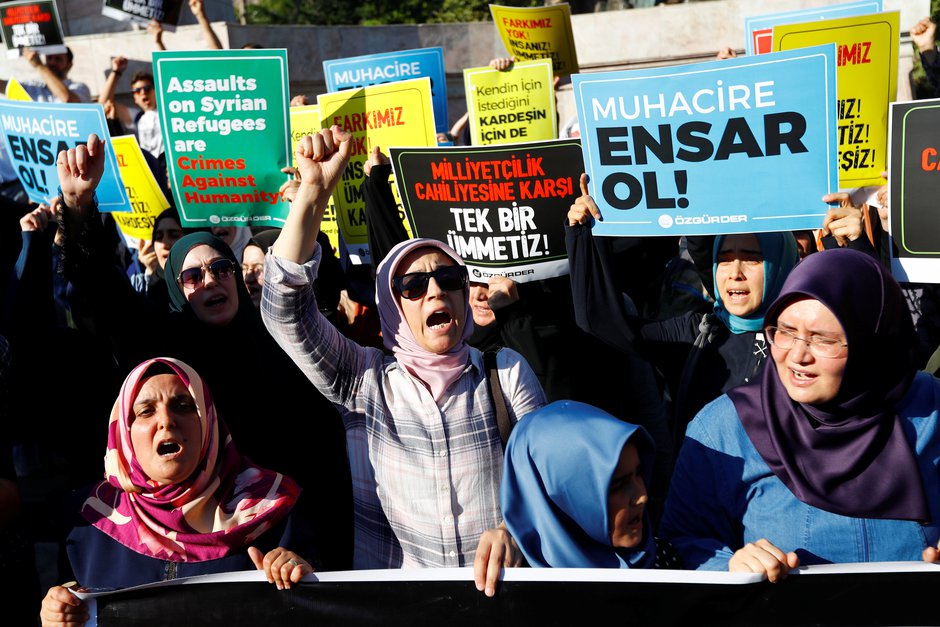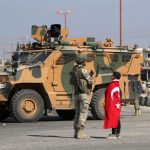Even before its recent invasion of Northeast Syria, Turkey was attempting to force Syrians home. Gareth Chantler looks at how such efforts fit into international refugee law.
The world has been watching the Turkish-Syrian border since US withdrawal from Northeast Syria in early October opened the door for a Turkish offensive into the autonomous region currently held by the Syrian Democratic Forces. Turkish President Recep Tayyip Erdoğan says he wants to create a “safe zone” for Syrian refugees — not for refugees fleeing the ongoing conflict in northwest Syria’s Idlib province, but rather for the millions of Syrian refugees already in Turkey, whom Erdogan has been threatening to send on to Europe and back to Syria alike for some time.
Speaking with dozens of Syrian refugees over the past several months, it is clear refugees in Turkey, even before the recent incursion, have felt they are running out of options. Turkey’s state-controlled media increasingly aims, it seems, to normalize both the idea of forcible repatriation and of demographic engineering — sending Syrians “home” to a region most are not actually from. A November 5 column in the Daily Sabah, for instance, called the safe zone “long awaited” and noted that it “may soon become home to around 2 million Syrian refugees currently in Turkey.”
Forcibly sending refugees home, the act legally known as refoulement, is strictly against international law. But a growing record, from international NGO reports and local Turkish sources alike, attest the illegal practice has been happening in Turkey for nearly three years.
“I feel like I am in prison. I need to get out of Turkey,” Muhammed, a Syrian refugee, wrote to OpenCanada in August. “I found a job here, but the government wants us to leave Istanbul.”
After finding little work for nearly a year, Muhammed, who left Syria in 2014, began regular shifts at a textile factory in July. Just one month later, the Turkish government announced that Syrians found outside the province in which their foreigner identity number (known in Turkey as kimlik) was issued would be forcibly relocated to that province. The government told Syrians they had until the end of August to return to those provinces and then, after some initial backlash, postponed the date to October 30. It has not publicly said whether the deadline has been extended or not.
“I don’t want to go to Bursa, I don’t know anybody there,” Muhammed said of the province where he first arrived. “I can’t go to Bursa without any money. I will be homeless and hopeless, no money, no work, no home.”
His 15-minute walk to work, through an Asian-side suburb of Istanbul that houses a large number of Syrian refugees, became the riskiest part of his day — he could be picked up at any moment. His predicament is typical. “Many people were deported from Istanbul,” an October 25 Amnesty International report affirms, “and were apprehended while they were working or walking down the street.”
The report continues: “contrary to the Turkish authorities’ claims that they do not deport anyone to Syria, in mid-2019 it is likely that hundreds of people across Turkey were swept up, detained, and transported against their will to one of the world’s most dangerous countries.”
Turkey’s invasion of Northeast Syria makes it all the more likely that some forced and coerced relocations will take place, though the geopolitical realities of the situation change day to day and week to week. In a recent column, Elizabeth Tsurkov, a fellow at the US-based Foreign Policy Research Institute, wrote that Turkey’s military incursion is likely displacing far more people than it is allowing to repatriate voluntarily. The UN Office for the Coordination of Humanitarian Affairs says that number could be “over 130,000 civilians.”
As the October 30 deadline approached, Muhammed thought he had no choice but to relocate to Bursa. He could not risk being returned to Syria under any circumstances, he said. But at the last minute, his Turkish boss succeeded in getting Muhammed’s kimlik registration transferred to Istanbul, enabling him to stay.
“They started some deportations, then they stopped, then they returned some people,” said Bassam al-Kuwatli, managing director of Istanbul-based RMTeam, which monitors conflicts in the Middle East and North Africa region, specializing in Syria. “It is such a mess — basically reactionary, not very well organized.”
Turkey and international law
Erdogan’s Justice and Development Party, or AKP, was once darling to Syrians everywhere, because it allowed nearly four million to flee the conflict to Turkey. But the party has changed tactics, after a June electoral defeat in Istanbul’s mayoral race.
“There are multiple reasons for what is happening,” al-Kuwatli explained. “Number one is fatigue from the Turkish people on the issue of Syrian refugees. Second is the economic situation, which is getting worse. Third, the opposition parties have been using the Syria issue against the AKP. So it seems now like the AKP is becoming tougher as a political survival mechanism.”
In December 2018, Turkey was one of 164 UN member states to adopt the Global Compact for Refugees (GCR), a document one might expect could somehow combat forcible repatriations. But Jeff Crisp, former head of policy development and evaluation with the United Nations High Commissioner for Refugees (UNHCR), now at the Refugee Studies Centre at Oxford University, warns against placing much hope in the document.
“I would say that we should not take the global compact too seriously. It’s a non-binding document without specific obligations, and many of the states that have endorsed it in principle will violate or ignore it in practice,” he told OpenCanada.
“One of the main outcomes will be a proliferation of additional meetings.”

Indeed, point 97 of the GCR would seem to indicate that Turkey is in fact providing more to Syrians than is being asked of host states: “Local integration is a sovereign decision and an option to be exercised by States guided by their treaty obligations and human rights principles.” Turkey provides free schooling to Syrian children, for example, though it does not provide any path to regular status, much less citizenship, for their ‘guest’ parents. Elsewhere the GCR describes local integration as “a dynamic and two-way process.”
Syrians once again find themselves bargaining chips, with each new wager published in international headlines, whether it is the two million in Idlib who could flee through Turkey to Europe or the one million in Turkey that Erdogan threatens to deport to northeastern Syria’s autonomous region in an effort to dilute its Kurdish demographics. Nowhere in this politicking is the recognition of Syrians’ essential humanity as enshrined in international law, or the well established history of “safe zones” being completely unsafe.
A high-level meeting set for December 16-18 in Geneva will focus on the GCR, next steps and on “arrangements for burden and responsibility-sharing,” among other things.
“It’s now three years since the New York Summit was held, and so the pace of the global compact process has been — and will continue to be — a rather leisurely one,” Crisp said.
“I suspect that anything remotely positive that happens to refugees in the immediate future will be credited to the compact — which, for the UN, has to be seen as a success given everything that has been invested in it — while anything negative will receive much less attention. Just look at the compact itself to see the extent to which it ignores the increasingly hostile environment for refugee protection around the world.”
Crisp noted that the UNHCR has only a limited range of options at its disposal if a state violates refugee protection principles: “quiet diplomacy, public diplomacy, naming and shaming, mobilizing public opinion and the support of other stakeholders such as NGOs and human rights agencies.”
What’s next for Syrian refugees
Meanwhile, the price to stay in Turkey is going up.
“I had problems because I didn’t have a kimlik,” Hosam, a Syrian professional who has been in Istanbul more than five years, told OpenCanada. “I had to pay a bribe to get it — US$2,500.”
“We are targeted,” he added, speaking to an increasingly hostile environment. “Whenever you go to the police, they will arrest you, whatever the problem. At work they sent us a warning to not hire Syrians.”
The atmosphere of increasing fear, and the lack of protection, is encouraging Syrians to take bigger risks, whether to return to a Syria in shambles or to pay a smuggler to get to Greece. Some have returned to territory held by the Assad regime given promises of amnesty, only to be disappeared into its infamous detention apparatus.
“The claims that Syria is safe for returnees willfully ignore a broad range of policies put in place by the Assad regime that effectively blocks their return,” Maha Yahya of Carnegie’s Middle East Center wrote. “[F]or every internally displaced or refugee Syrian who returned, three were newly displaced.”
The willingness of people to chance the water that separates Greece and Turkey has increased, even while the conditions in island processing centres from Lesvos to Kos are worse than ever.
“The EU-Turkey deal has never really worked as intended,” Crisp said, referring to the deal struck in 2016 by which Turkey receives several billion Euro to maintain its refugee population. “But it has arguably contributed to a reduction in the number of new arrivals from Turkey — although they have gone up in recent weeks.”
Turkish authorities have been clear in their denials that deportations are not happening. In a recent press release the Directorate General of Migration Management stated that “Turkey accepted all the Syrians crossing its borders in a mass influx in 2014” and claimed that it has “not send any Syrians back in line with non-refoulement principle.”
Worryingly, the GCR seems potentially enabling of the ongoing normalization of the Assad regime. For example, it reads: “It is recognized that voluntary repatriation is not necessarily conditioned on the accomplishment of political solutions in the country of origin,” potentially paving the way for returns to Syria without a cessation of conflict.
Back in 2017, Crisp warned that talk of large scale repatriation was premature. Now, he says it is still too early to frame Syria as ready for safe and dignified returns.
“The UN has been careful to say that the time is not yet right for large-scale refugee returns to Syria,” he told OpenCanada. “But that is what it is planning and preparing for behind the scenes — with the support of donors who (a) recognize that Assad has, to all intents and purposes, won the war, and (b) want to bring an end to the refugee situation and the heavy demands that it makes on their aid budgets.”
If all observers can agree on one thing, it is that conditions for Syrians in Turkey will continue to deteriorate. Meanwhile it is becoming consensus that the UN’s work inside Syria has been entirely compromised for years, to the benefit of one of the world’s worst regimes.
On Syria’s periphery — in Lebanon, Turkey and Jordan — if the UN cannot be counted on to protect large refugees populations from the vagaries of international politics and the caprice of their host countries’ domestic politics, who can?
For Canadians, the GCR’s inability to improve conditions for Syrians underscores the value of resettlement. “Lower [resettlement] admissions constrain UNHCR’s ability to deliver on its refugee protection mandate and diminish our humanitarian negotiating power at the global level,” Filippo Grandi, UN High Commissioner for Refugees, said in a November 2 statement largely aimed at the US’s retreat from resettlement.
Freelance writer based in Gaziantep, Turkey
Source: opencanada



